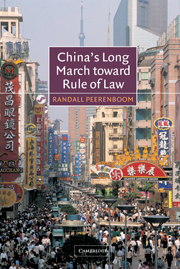Book contents
- Frontmatter
- Contents
- Preface
- List of abbreviations
- 1 Introduction
- 2 The evolution of rule of law in China: the role of law in historical context
- 3 Post-Mao reforms: competing conceptions of rule of law
- 4 Rule of law and its critics
- 5 Retreat of the Party and the state
- 6 The legislative system: battling chaos
- 7 The judiciary: in search of independence, authority, and competence
- 8 The legal profession: the quest for independence and professionalism
- 9 The administrative law regime: reining in an unruly bureaucracy
- 10 Rule of law and economic development
- 11 Rule of law, democracy, and human rights
- 12 Conclusion: the future of legal reform
- References
- Index
5 - Retreat of the Party and the state
Published online by Cambridge University Press: 20 July 2009
- Frontmatter
- Contents
- Preface
- List of abbreviations
- 1 Introduction
- 2 The evolution of rule of law in China: the role of law in historical context
- 3 Post-Mao reforms: competing conceptions of rule of law
- 4 Rule of law and its critics
- 5 Retreat of the Party and the state
- 6 The legislative system: battling chaos
- 7 The judiciary: in search of independence, authority, and competence
- 8 The legal profession: the quest for independence and professionalism
- 9 The administrative law regime: reining in an unruly bureaucracy
- 10 Rule of law and economic development
- 11 Rule of law, democracy, and human rights
- 12 Conclusion: the future of legal reform
- References
- Index
Summary
This chapter examines the theoretical relationship between single party socialism and rule of law as well as the actual role of the Party in legal reforms and the daily operation of the legal system. I argue that although single party socialism is not compatible with a Liberal Democratic or Communitarian rule of law, it is theoretically compatible with a Statist Socialist or Neoauthoritarian rule of law. In practice, however, the Party, Party organs, and individual Party members often act in ways that are inconsistent with any form of rule of law. Nevertheless, the Party is only one of the obstacles to rule of law. In terms of the daily operation of the legal system, the most significant obstacles are systemic or institutional in nature. The Party plays only a limited role in the day-to-day operation of the legal system. Its role in law-making and administrative rule-making is increasingly indirect and limited to macro policy guidance and review; moreover, only rarely does the Party directly intervene in the adjudication of specific cases. Rather, the Party's main relevance to rule of law lies in its ability to promote or obstruct further institutional reforms required to implement rule of law.
The Party's role in the legal system must be understood against the backdrop of the changing role of the Party in the Chinese polity as a whole.
- Type
- Chapter
- Information
- China's Long March toward Rule of Law , pp. 188 - 238Publisher: Cambridge University PressPrint publication year: 2002
- 1
- Cited by



